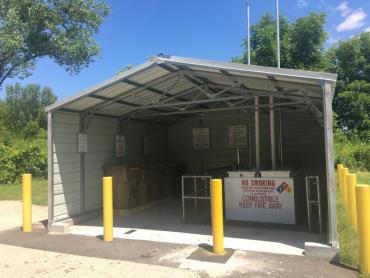Wheeler Road oil drop-off site reopens, refine your oil disposal knowledge
The City of Madison Engineering Division re-opened its waste oil site at the corner of Wheeler Road and School Road on the north side of Madison with a more modern tank. It was closed since December 2018 for upgrading.
Residents should use this drop-off for used motor oil they may have. The City collects waste oil from residents to reduce the amount of oil entering the storm sewer system. The storm and sanitary systems is made up of curbs, gutters and pipes that catch runoff water and drain into our lakes, streams and local waterways. Sometimes residents pour oil into the storm sewer system, which is very harmful to environment. That’s why the City offers three oil drop-off sites for residents to safely dispose of the oil after everyday actions like oil changes from vehicles, lawn care equipment and boats.
The City of Madison used oil public drop-off sites are located at:
- East side location: City of Madison Garage, 200 N. First St.
- Southeast location: Monona Golf Course, 111 E. Dean Ave.
- Northeast location: 902 Wheeler Rd.
Modern design, no more waiting
Another new feature of the Wheeler Road location is it will be a dual-wall, 2 by 500 gallon double-compartment steel tank, so one side will always be open for the public to use. The dual-wall means the tank has two layers, and if the inner wall leaks, oil will still be contained by the outer tank wall, thus protecting the environment from the release of oil. The double compartment is important because while the drop-off locations are open 24/7 to the public, every two weeks they get shut down temporarily to test for polychlorinated biphenyls (PCBs). With the double compartment, one side will always be open for the public while professionals test the oil.
PCBs were banned in the United States in 1979 because of harmful effects on human health and the environment. PCBs may be in products and materials produced before 1979 including transformers, capacitors, electrical equipment, oil used in hydraulic motors, fluorescent light ballasts, adhesives and tapes, oil-based paint and plastics.
Illegal disposal of PCB-tainted oil in the tanks can result in a fine of up to $25,000 and/or up to a year in prison.
If PCBs contaminate the recycled oil in the drop-off sites, the process to clean is costly to the taxpayers and puts the future of the waste oil recycling program in jeopardy.
While PCB dumping is rare, the City would like all residents to stay knowledgeable about the impacts it can have on the environment, along with the resources that are available for safe disposal of used oil.
Contacts
- Hannah Mohelnitzky, City of Madison Engineering Division Public Information Officer, 608-242-6003, hmohelnitzky@cityofmadison.com
